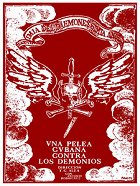Reviews (1)
The Wild West or perhaps Wild West Indies? The double nonsense of ahistorical comparison: this is not the USA, and this is not India. Nevertheless, the film is full of Eurocentrism and the centrism of the white race: the colonial state of the 17th century is like the Wild West - with the absence of law and the sanctification of one law only: personal profit at the expense of everything and everyone who is or was here. Cuba is truly like the India of the West, which Columbus never discovered and at the same time discovered - Cuba only appears here as a new "India" for Europe, a new field for its expansion. However, the double material enslavement is duplicated in the realm of ideas through cultural extrapolation from Europe - religion. It is fascinating to see, as in The Last Supper and other Latin American films, the ambivalent role that religion plays - from the more obvious role of enslavement to chiliasm visions of salvation. In this regard, the film surpasses the initial European idea of savages and the new land as a land of purity and uncorrupted people and completely confirms the historical shift (which naturally happened very soon) after which the new land and those who live in it become more of a danger and a subject of spiritual struggle rather than an innocent blank slate race prone to accepting the white truth of Jesus. The Church and Europe thereby confirm their own powerlessness indirectly proportional to their actual power. This powerlessness leads to disillusionment. The Europeans are left with only one thing: to choose. To choose between their total ideological emptiness and to become only what they have always been: power-hungry, pleasure-seeking demons, against whom religion has always wanted to fight on an ideological level. Or to be blind to their own emptiness and to throw themselves into religious frenzy even more strongly. The Europeans' own struggle with themselves as the foundation for the liberation of others from the Europeans could thus be the motto of the film. This is because people long for salvation, and the colonialist Europeans will never be able to offer it to them, having lost it themselves. /// Fortunately, even Alea freed himself to a certain extent from the Euro-North American heritage, and his film full of noisy and violent frenzy, flooded with raw images full of urgency and resistance, clearly recalls Cinema novo.
()
